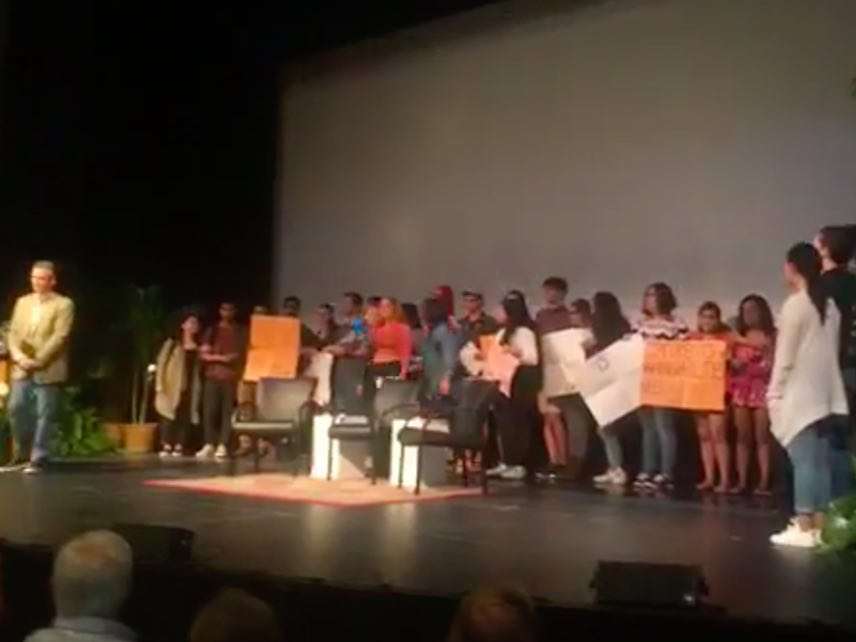Duke Students Who Hijacked Alumni Event: Punishing Us Would Hurt Us Mentally
Activists who stormed the stage were shocked when alumni in the audience dared to heckle them.

Two dozen student activists crashed an alumni event at Duke University on Saturday, using a megaphone to make their demands and drown out the speaker, Duke President Vincent Price. The students were surprised to discover that their interruption had irritated many alumni in the audience, some of whom heckled the activists and turned their backs while the demands were read.
Now Duke's administration is considering whether to discipline the students, whose behavior unquestionably violates university policy. That doesn't sit well with them: Protest leader Gino Nuzzolillo accused administrators of aggravating the mental health problems of student activists. The administration's letters informing students that they are under investigation have had the effect of "exacerbating any pre-existing mental health conditions," Nuzzolillo told The Duke Chronicle.
The protest happened during an alumni event reflecting on the 50th anniversary of the 1968 Silent Vigil at Duke, a series of student-led sit-ins on campus. Nuzzolillo and his comrades sought to channel the spirit of the Silent Vigil, although their protest was anything but silent. About 25 students stormed the stage inside Page Auditorium while Price was speaking and chanted, "President Price get off the stage," and "Whose university? Our university," until they had command of the room. Then they read a list of demands, which included raising the university's minimum wage to $15 an hour, hiring more faculty members of color, and spending more money on counseling services.
The Duke Chronicle reported that some in the audience supported the students, while others did not:
The protesters received mixed reactions from the alumni in the audience. Some alumni did nothing while others booed loudly or clapped in support. Many alumni stood up and turned their backs to the stage, some shouting vulgarities—the protesters reported hearing racial epithets.
The protesters noted that they were surprised by the extent of the alumni's negative reactions. [Student organizer Bryce] Cracknell added that he was disappointed that the administrators focused more on stopping the students than angry alumni, Cracknell said.
"Instead of actually going to the alumni and saying 'that's not appropriate' or removing them from the space, they were more worried about us," Cracknell said.
This was not an uncommon opinion among the protest's leaders. Nuzzolillo expressed disappointment that the adults "whose job it is to care for us" failed to do so.
Readers may find it remarkable that these students expected the other people in the room to applaud and validate them for derailing the event. The students also think the university should refrain from punishing them, because any punishment would contribute to their mental health problems. According to Nuzzolillo:
I think we are particularly concerned that the University knows that by sending these conduct letters out that they will be concerning the students and that they will be exacerbating any pre-existing mental health conditions and, like Bryce said, traumatizing and starting new ones, especially after Saturday's issues. I think that among the many things that we share in common with the administration, the number one thing is that we all want to see this University be better and be more accommodating and make changes. We're not sure why they're not taking that approach too and reaching out to us in good faith rather than initiating a conduct process.
These students want to have it both ways. They want to fight injustice, engage in civil disobedience like the activists of yore, and thumb their noses at the administration. At the same time, they want administrators to make them feel safe and comfortable, shield them from criticism, and play the role of the protective parents. They want to be celebrated as resistance fighters and treated like trauma victims. The student activists of 2018 require a lot of hand holding as they overthrow their oppressors.


Show Comments (214)